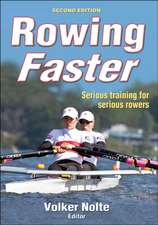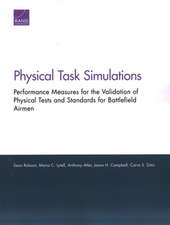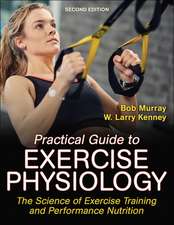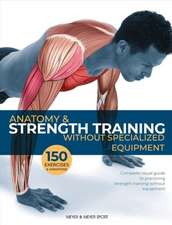Monitoring Training and Performance in Athletes
Autor Mike Mcguiganen Limba Engleză Hardback – 18 apr 2017
Author Mike McGuigan, an award-winning sport scientist, blends research-based concepts with practical application strategies of monitoring training and performance in athletes. The content highlights what can be monitored, such as body stress, biochemical markers, and hormonal response; discusses reliability of modern methods, such as wearable technology and questionnaires; and helps readers understand how to interpret data to modify training programs in real time. Readers will find guidelines, approaches, and solutions for challenges in athlete monitoring for individual and team sports as well as suggestions for integrating monitoring with coaching.
Numerous sidebars in the text provide real-world examples and application of the content to assist readers in understanding concepts and the cutting-edge, evidence-based research on athlete monitoring. Additionally, the full-color illustrations and photographs provide a visual interpretation of the information presented.
With broad international appeal, this text outlines the most pertinent evidence-based research concepts and studies on athlete monitoring. Strength and conditioning, athletic training, and personal training professionals who work with athletes and monitor training programs will find Monitoring Training and Performance in Athletes an invaluable guide in managing monitoring systems and making adjustments in training programs based on the data to help athletes and teams achieve peak performance.
Preț: 366.67 lei
Nou
70.17€ • 76.20$ • 58.94£
Carte disponibilă
Livrare economică 01-15 aprilie
Livrare express 18-22 martie pentru 67.04 lei
Specificații
ISBN-10: 1492535206
Pagini: 264
Dimensiuni: 216 x 293 x 19 mm
Greutate: 1.18 kg
Editura: Wiley
Descriere
The use of athlete and team training and performance monitoring systems has grown due to technology advances. Practitioners who work with athletes from high school to elite levels in a range of sports use these systems to observe athlete data, including exercise intensity, athletic fitness, and body responses. Monitoring Training and Performance in Athletes is a compilation of evidence-based guidelines and best practices of athlete monitoring for practitioners, who are increasingly being asked to implement monitoring systems and to collect, analyze, and interpret data that ultimately result in training adjustments to optimize performance.
Author Mike McGuigan, an award-winning sport scientist, blends research-based concepts with practical application strategies of monitoring training and performance in athletes. The content highlights what can be monitored, such as body stress, biochemical markers, and hormonal response; discusses reliability of modern methods, such as wearable technology and questionnaires; and helps readers understand how to interpret data to modify training programs in real time. Readers will find guidelines, approaches, and solutions for challenges in athlete monitoring for individual and team sports as well as suggestions for integrating monitoring with coaching.
Numerous sidebars in the text provide real-world examples and application of the content to assist readers in understanding concepts and the cutting-edge, evidence-based research on athlete monitoring. Additionally, the full-color illustrations and photographs provide a visual interpretation of the information presented.
With broad international appeal, this text outlines the most pertinent evidence-based research concepts and studies on athlete monitoring. Strength and conditioning, athletic training, and personal training professionals who work with athletes and monitor training programs will find Monitoring Training and Performance in Athletes an invaluable guide in managing monitoring systems and making adjustments in training programs based on the data to help athletes and teams achieve peak performance.
Cuprins
Preface
Acknowledgments
Chapter 1. Why Monitor Athletes?
Stress Response to a Training Session
Adaptation to a Training Program
Risk of Overreaching, Overtraining, Sickness, and Injury
Importance of Individualized Monitoring
Conclusion
Chapter 2. Research Tools for Athlete Monitoring
Basic Statistical Tools for Practitioners
Descriptive Statistics
Reliability
Validity
Meaningful Change
Correlation and Relationships
Presentation of Results
Qualitative Analysis
Conclusion
Chapter 3. Physiological Effects of Training Stress
General Adaptation Syndrome Model
Fitness-Fatigue Model
Stimulus-Fatigue-Recovery-Adaptation Model
Applications of the Models
Fatigue Continuum
Overreaching and Overtraining
Interdisciplinary and Multifactorial Approaches to Avoid Overtraining
Conclusion
Chapter 4. Quantifying Training Stress
Measurement Tools
External Load
Internal Load
Conclusion
Chapter 5. Measures of Fitness and Fatigue
Neuromuscular Fatigue
Heart Rate
Hormonal and Biochemical Markers
Immunological Markers
Performance Tests
Conclusion
Chapter 6. Current Monitoring Practices and Technologies
Monitoring Practices in Sport
Monitoring Technologies
Data from Monitoring Technology
Applications of Monitoring Technology
Conclusion
Chapter 7. Integrating Monitoring With Coaching
Art and Science of Monitoring
Monitoring Data Within a Training Session
Providing Monitoring Feedback to Athletes
Barriers to Effective Athlete Monitoring
Conducting In-House Monitoring Projects
Conclusion
Chapter 8. Athlete Monitoring Guidelines for Individual Sports
Individual Sport Athletes
Monitoring in Individual Sports on a Budget
Monitoring With Training Diaries
Applying Monitoring in Individual Sports
Reporting One Week of Monitoring for an Athlete
Modifying Training Based on Monitoring
Considerations for Monitoring Athletes in Individual Sports
Conclusion
Chapter 9. Athlete Monitoring Guidelines for Team Sports
Team Sport Athletes
Monitoring in Team Sports on a Budget
Applying Monitoring in Team Sports
Monitoring System for Team Sport
Reporting One Week of Monitoring for a Team Sport
Modifying Training Based on Monitoring
Considerations for Monitoring Athletes in Team Sports
Conclusion
References
Index
About the Author














